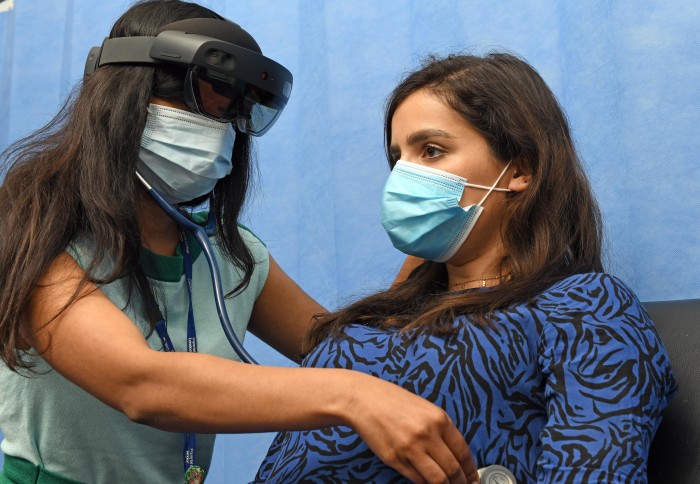School of Medicine wins Transformation award for mixed-reality clinical teaching

Dr Risheka Walls shares a patient interaction with students virtually using the Microsoft HoloLens headset
The School was awarded the prize by the Real IT Awards for the use of the Microsoft HoloLens to deliver live clinical teaching during the pandemic.
Held annually, the Real IT Awards have run since 2004. They aim to highlight organisations deserving particular recognition for hard work, commitment and innovation.
The Transformation of the Year Award is part of the ‘Innovation’ category and recognises an organisation that has pushed the boundaries towards transforming their business.
Professor Amir Sam, Head of Imperial College School of Medicine (ICSM), said, “We are incredibly proud to have been presented this award. It is testament to the hard work of the dedicated staff involved that our innovation and creativity has been recognised in this way.
“I’d like to give specific thanks to the teams in ICT and Education Technology, to our digital teaching fellows led by Dr Risheka Walls, and to colleagues at our affiliated NHS Trusts and Health Education England for their support for the project through a very difficult year.”
Previous winners of the Transformation of the Year award include organisations such as Pepsi, Virgin Atlantic, HMRC and Royal Mail.
COVID-19 challenges
The pandemic set a significant challenge for the continued delivery of medical education in particular, with sudden limits on patient access requiring considerable changes to expected clinical experience and teaching.
Determined to continue delivering high-quality clinical, patient-facing education, ICSM initiated a collaboration with Microsoft.
The collaboration builds on Dr James Kinross’ use of the technology in direct clinical care and adapts it for medical education. Using mixed-reality technology, clinician educators wear a HoloLens headset during a live patient interaction, and live stream their view.
Students log in via Microsoft Teams and join the consultation virtually.
Students can see and hear the same things as their clinician educator and can interact with them via the headset. The mixed-reality also allows the ‘real’ surroundings to be supplemented with overlaid digital information, such as the patient’s drug charts or radiographs.
Sharing knowledge
Already receiving positive feedback from medical students, the technology will promote parity of education across large numbers of students at any one time. It broadens access and opportunities for experiential learning about a variety of conditions without the need to be physically present on crowded ward rounds.
It also allows for the potential to provide education for a broad range of audiences further afield.
Looking forward, Professor Sam added, “While the pandemic accelerated existing goals of delivering our medical education in new and innovative ways, we believe this is only the beginning for the integration and development of this technology. This award shows that these developments are valued across sectors, and we must continue to look for ways to collaborate to push boundaries and share knowledge.
“We are confident that there is potential to widen access to and share Imperial’s quality teaching with a vast global community.”
Article text (excluding photos or graphics) © Imperial College London.
Photos and graphics subject to third party copyright used with permission or © Imperial College London.
Reporter
Dorrit Pollard-Davey
Faculty of Medicine Centre